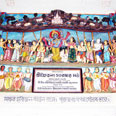Author: Vishakha Dasi
-
Śrīla Bhakti Sundar Govinda Dev-Goswāmī Mahārāj reveals his personal meditation when he arises every morning.
-
Śrīla Bhakti Rakṣak Śrīdhar Dev-Goswāmī Mahārāj on the way to make calculations and progress through the gradation of theism.
-
Śrīla Bhakti Sundar Govinda Dev-Goswāmī Mahārāj discusses the proper approach to divinity, and the genuine humility of the true Vaiṣṇavas.
-
Śrīla Bhakti Sundar Govinda Dev-Goswāmī Mahārāj gives caution to practitioners on the day of Śrī Lalitā Devī’s appearance.
-
Śrīla Bhakti Rakṣak Śrīdhar Dev-Goswāmī Mahārāj discusses the tṛṇād api principles in depth.
-
Śrīla Bhakti Rakṣak Śrīdhar Dev-Goswāmī Mahārāj describes the eliminative, yet accommodating nature of progress.







